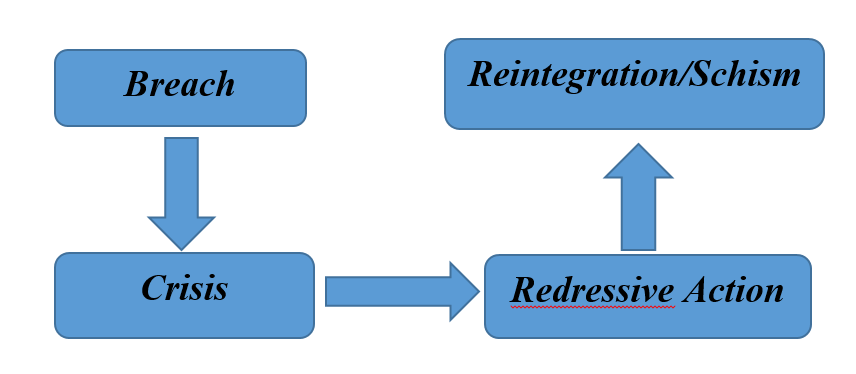Introduction
As an attempt to investigate the ethnography of legal discourse orders and theoretical cinematic figuration, this paper focuses on “The Story of Qui Ju” film to analyze Qui Ju’s approach to conflict resolution. Released in the year 1992, the film has won internationally reorganized film festival awards, such as the Golden Lion Award. The film is a depiction of the post-Cultural Revolution’s success of artistic experimentation.
Through putting an emphasis on the Chinese legal system and bureaucracy, the film provides an illustration of how cultural and social concerns have continued to wrestle for ideologically symbolic origin. In line with this view, the movie contains a strategy, which serves as an appropriate case study for Turner’s “model of social drama.”

“The Story of Qiu Ju”
“The Story of Qiu Ju” revolves around conflict resolution approaches such as litigation, mediation, and arbitration with each exemplifying a narrative that controls, shapes, and orders the meaning of the Wan-Wang dispute. The explanation of the cinematic parable used in the film offers a principal public figure, Qui Ju, a pregnant peasant woman. She takes her injured husband on an arduous journey to visit a Chinese doctor.
The trip to see the doctor turns out to be a quest for justice after her husband was injured in a clash with a village head, Chief Wang Sharing. Although Qiu Ju and the family intend to rebuild shed for the chili peppers, the chief flatly rejects the proposal. The disagreement results in an intense argument that makes Wan insult the chief. The aggravated chief kicks him in the crotch, which results in Wan’s being handicapped for months.
Qiu Ju and Conflict Resolution
As established in the brief summary of the story, Qui is not seeking revenge but justice. She wants the chief to acknowledge the fact that kicking his husband in the crotch was incorrect. Qui believes that the best way to acknowledge his mistake is through an apology. Qui wants to know why the chief kicked her husband, “where it matters.” As a result, she wants justice for the chief. Although she wants the chief’s apology, all she can get is money that acknowledges the chief has made a mistake.
Investigations of the conflict are concluded a month after Qui delivers a baby boy. Although Qui expects the chief to attend the baby’s one-month anniversary, he is not able to attend because he has been given a fifteen-day jail sentence for the previously committed atrocities.
Qiu Ju’s goal changes during her pursuit since she was in labor. Labor pains become an obstacle to her pursuit of justice. People identify grievances that go up the line of supervision as an obstruction of justice and are perceived as difficult. When a case is appealed in the line of supervision, it will take a longer period to resolve. As evidenced in the film, Qui Ju does not get justice since she keeps on interfering with the process of obtaining justice. When she breaks into labor, the authorities are finally able to conduct a successful investigation.
It is upon Qui’s appeal request for justice that forces her to seek justice outside the court. The judicial services operate in a system modeled after the ideology of democracy. This system is devoid of humanity as well as the recognition of individuals. The first appeal took place when Qui Ju went to the local police to make a complaint.
However, this quest for justice does not bear fruit since the village chief had initially paid 200 yuan for the damages caused to Wan. Qui Ju’s appeal is considered a failure since Qui Ju’s quest is not for the husband to be compensated but a quest for an apology from the village chief. On the other hand, when seeking revenge, a person may fail to get justice. Seeking revenge is an obstacle and an obstruction to justice.
In the case of the chief and Wan, Qui is a third party. A third party is defined as a group of people or a person besides the two who are predominantly involved in a dispute resolution. Qui is a third party in this case since she is not directly affected in the course of the conflict. The third-party should be heard.
Most of the time, victims are not able to resolve their own conflicts. When a third party presents a case on behalf of the victim, there are high chances that justice will be served. Instead, she acts as a mediator interested in addressing the conflict. Being a wife to the victim, Qui sees the need to seek for justice. With Wan’s inability to walk, Qui assumes the responsibility of taking her victim to a Chinese doctor.
For a manager dealing with a person who can’t let go, it is important to adopt the most effective approaches to conflict resolution. Although conflicts are an integral part of society, they are not always handled in a constructive manner. In this case, as Qui’s quest for justice continues, she resorts to formal and informal approaches to conflict resolution.
In light of both the future and present conflicts, I would put more concentration on what should be done instead of focusing on past issues. Therefore, the offender should compensate the victim for the lost wages and bear the medical cost in the light of acknowledging his mistake.